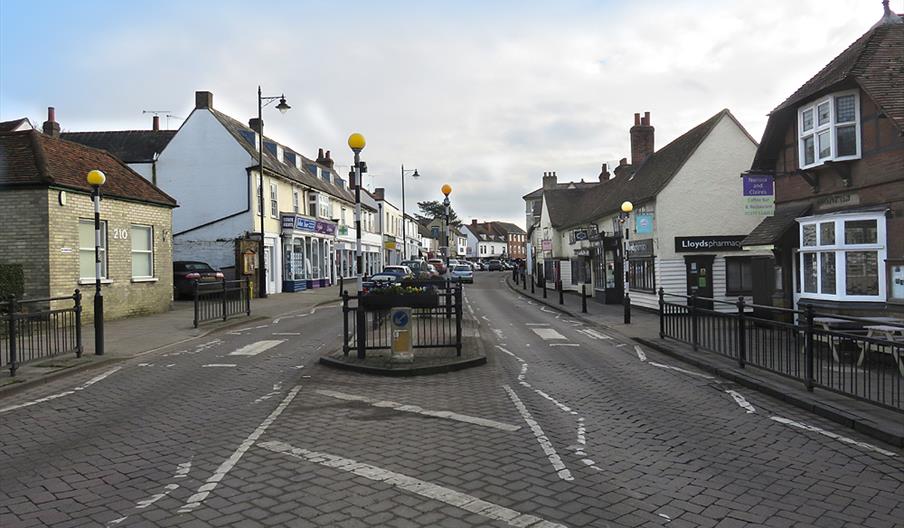Book Tickets Online
About
Chipping Ongar (to give the town its proper title) is derived from two Old English words meaning ‘market’ and ‘grazing land’. It was the centre of the Saxon administration of the Ongar Hundred and was probably a Saxon ‘burh’ (a fortified settlement). It had a short period of importance after the conquest when a motte and bailey castle was built during the Norman period, the remains of which can still be seen. More on medieval Ongar here and overlords the Counts of Boulogne here, and Richard de Lucy here.
The railway came to Ongar in 1865 when a line was extended from Loughton with stops at Epping, North Weald and Blake Hall. This enabled farmers to send agricultural products to a rapidly expanding Victorian London whilst importing things like coal and building materials. The station was built at the same time and is Grade 2 listed. After the Second World War the line became part of the Central Line but was closed in 1994. Happily the line is now home to historic steam and diesel trains as a heritage railway and an ideal way to arrive in style.
To celebrate the Millennium, a High Street walk was created with ten paving stones set in the pavement alongside places of interest. These are listed here:
Budworth Hall. This Grade 2 listed building was erected in 1886 in memory of Captain Budworth of nearby Greensted Hall. A three dial clock was added in 1887 to mark Queen Victoria’s Golden Jubilee. A ballroom was added in 1910 and this is now a local events venue. To celebrate Queen Elizabeth II’s Golden Jubilee in 2002, the clock was electrified.
King’s Trust Cottages. Adjoining Budworth Hall is a row of typical 17th century timber framed cottages, now with shop fronts added in the 19th century.
The King’s Head is a former coaching inn and the oldest brick built building in Ongar dated to 1697 by a panel over the arch. The building once had extensive stabling through the archway.
The ‘Bottleneck’ is a point in the street where the houses are closest either side of the road and is a living reminder of the point where a 12th century town gate guarded the entrance to a medieval Ongar enclosed by earthworks as part of the castle fortifications.
St Helens Church was opened in 1870. A stained glass window is dedicated to Father Byles, the incumbent priest from 1905 who died tending to others on the ill-fated RMS Titanic after she hit an iceberg in 1912.
United Reform Church. The present church was erected in 1833. The room over the passage was home to David Livingstone in 1838 whilst he was training for the ministry. A school hall at the rear was built in 1919.
Essex House was built in 1896 for the newly formed Ongar Rural District Castle. In the adjacent Castle Street, Jane Taylor, author of ‘Twinkle, twinkle, little star’, lived at number 15.
Wren House. Set back from the road is this elegant 18th century timber framed house with an original shop window. On the opposite corner is a 17th century building with a blocked doorway dated 1642.
St Martin’s Church dates from about 1080 with several later additions. Some medieval ‘great bricks’ (longer and narrower than more modern bricks) can be seen. The chancel roof dates from the 13th century and the belfry is 15th century. The church features a rare ‘anchorhold’ where a hermit could hear Mass and receive Holy Communion whilst remaining isolated.
The Cock Tavern is the oldest ale-house in the town with documented reference dated 1765 and older references going back to 1580.
The Castle whose remains can been seen today is thought to have been constructed by Richard de Lucy in 1155. Richard established a “chipping”, which is a regular market on the outskirts of the castle, which is still held each week. The castle would have had a wooden tower and the mound is about 55 ft. While the property is now in private hands, there is an informative display board adjacent to the library.
Further up the High Street, past the railway station, is Great Stoney which started life in 1905 as the Ongar Cottage Homes, housing 300 pauper children and foundlings from Hackney. It became Stoney School in 1955 and in 1997 was sold for housing. The Grand Hall remains and now forms part of the modern Zinc Arts Centre complete with studio space, classrooms a café and theatre.
On the edge of town is Ongar Leisure Centre with fitness facilities, a swimming pool and related classes and activities.
Ongar is home to numerous places to eat and drink including the famous Smiths Fish Restaurant or why not try afternoon tea at nearby Mulberry House.
Ongar also makes a great base from which to explore what the sounding countryside and discover what the villages and hamlets have to offer starting with the church at Greensted:
St Andrew’s Church, Greensted is the oldest wooden church in the world. The original timber planks date from about 1060 although excavations under the chancel reveal the existence of two earlier timber structures. Find out what the “leper’s squint” is, the grave of the unknown Crusader and where the body of St Edmund was rested on its way to Bury. The church is on the Essex Way in the direction of Epping which joins Ongar alongside the Sainsbury’s car park.
The Secret Nuclear Bunker is located just outside Ongar on the way to Kelvedon Hatch, and is the deepest and biggest cold war bunker open to the public in the south east. Walk around the displays and rooms where 600 military and civilian personnel would have lived and operated a regional government following a nuclear incident. The site is also home to Rope-Runners plus other adrenaline activities including archery, paintballing and the Nuclear Races.
For golf players, nearby Toot Hill Golf Club offers 6,254 yards through an 18 hole, par 70 course. Bentley Golf Club has a 6,703 yards, par 72 course which hosts the Essex County Championships and Essex Captains and is silver ranked in the HSBC Regional Course Rankings. Blakes Golf Club offers an 18 hole inland links course, and North Weald Golf Club is a championship 18 hole course which hosted the Essex Amateur and PGA East Region Championships.
Cyclists will find Ongar an ideal stop whilst exploring the lanes around nearby Moreton, Fyfield and Willingale where they can join the route of the Tour de France and follow it down to North Weald and on through Epping Town, the Forest and to London beyond.
Just a stop away on the Epping Ongar Railway, or scenic journey on the top floor of a heritage bus, is North Weald Airfield and the Airfield Museum. Although still recognisable as a Battle of Britain airfield, North Weald today is an operating aerodrome and home to numerous historic warbirds often seen in the skies over the district. As well as a regular outdoor Saturday market, the site hosts a number of open air events throughout the year, including archery, HGV & specialist driver training, rallies, classic and sports car shows, drag racing, cycle racing, charity events and “drive in” movies. Food and drink are available at Wings Café or The Squadron. The museum, housed in the former Gate House and adjacent war memorial celebrates the history of the airfield from the First World War to the jet age, including North Weald’s important contribution to the Battle of Britain. The memorial commemorates the Norwegian Squadron which made North Weald and the surrounding area its home during the Second World War.
Ashlyns Organic Shop and Restaurant, on the A414 between Ongar and North Weald, includes a petting farm, farm walk, children’s play barn and outdoor adventure playground. Ashylns hold special events for children and families throughout the year.
The nearby villages of Fyfield and Moreton have two charming pubs each whilst Willingale has two churches distinctly different sharing the same church yard!
Map & Directions
Road Directions
Car-parks in Ongar:
•The Pleasance Car parks (x3) are located at CM5 9AB next to the Library, Sainsbury’s supermarket and The Budworth Hall
•Ongar South Car park is located at CM5 9HD opposite The Two Brewers Pub.
Directions from Central London:
Navigate to the M11 heading north, come off at Junction 5, then take the A113 signposted to Stapleford and Ongar. At the junction with the A128, continue north on the A128 signposted to Ongar and Harlow. The A128 runs right through the middle of Ongar and goes past all the main car parks, the South car park is on your left just before you go over the river bridge, opposite The Two Brewers Pub.
Directions from East London:
Navigate to the A12, heading east. Continue to follow the A12 and at Junction 11, take the turning for Brentwood. Travel into Brentwood town centre, follow signs for the A128 signposted to Ongar, and follow this road through Pilgrims Hatch and Kelvedon and onto Ongar. The A128 runs right through the middle of Ongar and past all the main car parks.
Directions from the East:
Navigate towards Chelmsford and take the A414 signposted to Harlow. Once leaving Chelmsford, go straight over two roundabouts, continuing to follow the A414. At the Four Wantz Roundabout, take the left hand turning onto the A128, signposted to Ongar. As you approach the High Street you will pass The Pleasance car parks on your right and left, one next to the Library and the other opposite The Budworth Hall. A further car park is situated next to Sainsburys supermarket, just past The Budworth Hall.
Directions from the West:
Navigate towards Harlow (if coming along the M25, take Junction 27 onto the M11 heading north, signposted to Harlow and Cambridge, then come off the M11 at Junction 7). Take the A414 heading east, signposted towards Chelmsford. Go straight over two roundabouts. At the Four Wantz Roundabout, take the right hand turning onto the A128, signposted to Ongar. As you approach the high street you will pass The Pleasance car parks on your left and right, one next to the Library and the other opposite The Budworth Hall. A further car park is situated next to Sainsbury's supermarket, just past The Budworth Hall.
Public Transport Directions
By Bus:
Visiting Ongar by bus saves the hassle of driving and parking and is environmentally friendly. There are regular bus services from a number of major centres:
Further details, timetables, fares and journey planners can be found here: http://www.traveline.info/
By Train:
Take the train to London, then head for the London Underground Central Line, travelling East-bound. Take care to ensure your train is going to Epping (and not “Woodford via Hainault”). Epping is in Zone 6. Epping station offers step free facilities for the disabled.
Full timetables, fares and journey planner are available on www.tfl.gov.uk/tube
From Epping you can take a 339 heritage bus as part of the heritage railway services, these seamlessly integrate with the steam or diesel hauled heritage trains serving Ongar.

















